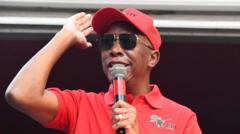South Africa's coalition government is precariously balanced as tensions between the African National Congress and the Democratic Alliance erupt over budgetary disputes. The DA's opposition to VAT increases and funding cuts has triggered legal challenges and discussions about the coalition's viability.
South Africa's Coalition Government Faces Critical Uncertainty as Budget Disputes Emerge

South Africa's Coalition Government Faces Critical Uncertainty as Budget Disputes Emerge
Tensions rise between the African National Congress and the Democratic Alliance, raising questions about the future of the coalition government.
South Africa's coalition government is experiencing significant strains as key divisions between the African National Congress (ANC) and the Democratic Alliance (DA) were starkly revealed during a critical vote on the national budget. In a significant display of opposition, the centre-right DA rejected the fiscal framework—a vital component of the budget—following their demand for a reduction in spending and an objection to increasing VAT.
The ANC, which identifies as a centre-left party, stood firm against what it termed the DA’s “austerity budget,” rallying support from various smaller parties to push the fiscal framework through Parliament, winning by 194 votes to 182. In reaction, the DA has initiated legal proceedings contesting the vote, citing procedural flaws, while senior party leaders are slated to convene to evaluate their continued participation in what is known locally as a government of national unity (GNU).
Political analyst Professor William Gumede noted that uncertainty looms over the DA's next moves—whether to leave the coalition now or wait for the court outcomes. The coalition was forged under considerable pressure from the business sector less than a year ago, following the ANC's loss of its long-held parliamentary majority during elections that marked a historical shift in governance since 1994.
DA spokesperson Willie Aucamp accused the ANC of a "serious infraction," suggesting an ultimatum had been crossed, and fellow member Helen Zille hinted at potential re-evaluations of their alliance, emphasizing the need for equitable power-sharing. On the other hand, ANC Parliamentary Chief Whip Mdumiseni Ntuli condemned the DA’s actions as a “complete betrayal,” asserting that other coalition parties remain committed to the GNU, regardless of the DA's position.
The DA found itself aligned with opposition parties that traditionally stand in stark contrast to its pro-business stance—joining forces with the uMkhonto weSizwe party and the Economic Freedom Fighters in opposing the VAT hike, which critics assert disproportionately affects the poor. DA leader John Steenhuisen criticized the ANC for being detached from economic realities faced by average citizens.
In addition, crucial support from the Inkatha Freedom Party and ActionSA, a breakaway faction from the DA, facilitated the ANC's successful passage of the fiscal framework. ActionSA stated it had reached a compromise that would eliminate the controversial VAT increase while alternative revenue mechanisms are considered.
Despite the advancements in passing the fiscal framework, analysts express skepticism about the ANC's ability to convince tax-paying citizens of the necessity for increased taxes in a climate of deteriorating public services. This ongoing budget dispute is emblematic of rising tensions, with the DA concurrently challenging other legislative measures in court—amplifying political inconsistencies that can further destabilize the coalition.
The backdrop of this political turmoil is further complicated by recently imposed tariffs by the Trump administration, which may intensify economic challenges for South Africa—the backdrop to which emphasizes the urgent need for both leading parties to either reconcile their differences or risk exacerbating the nation's already dire economic crisis amid soaring unemployment rates above 30%.





















